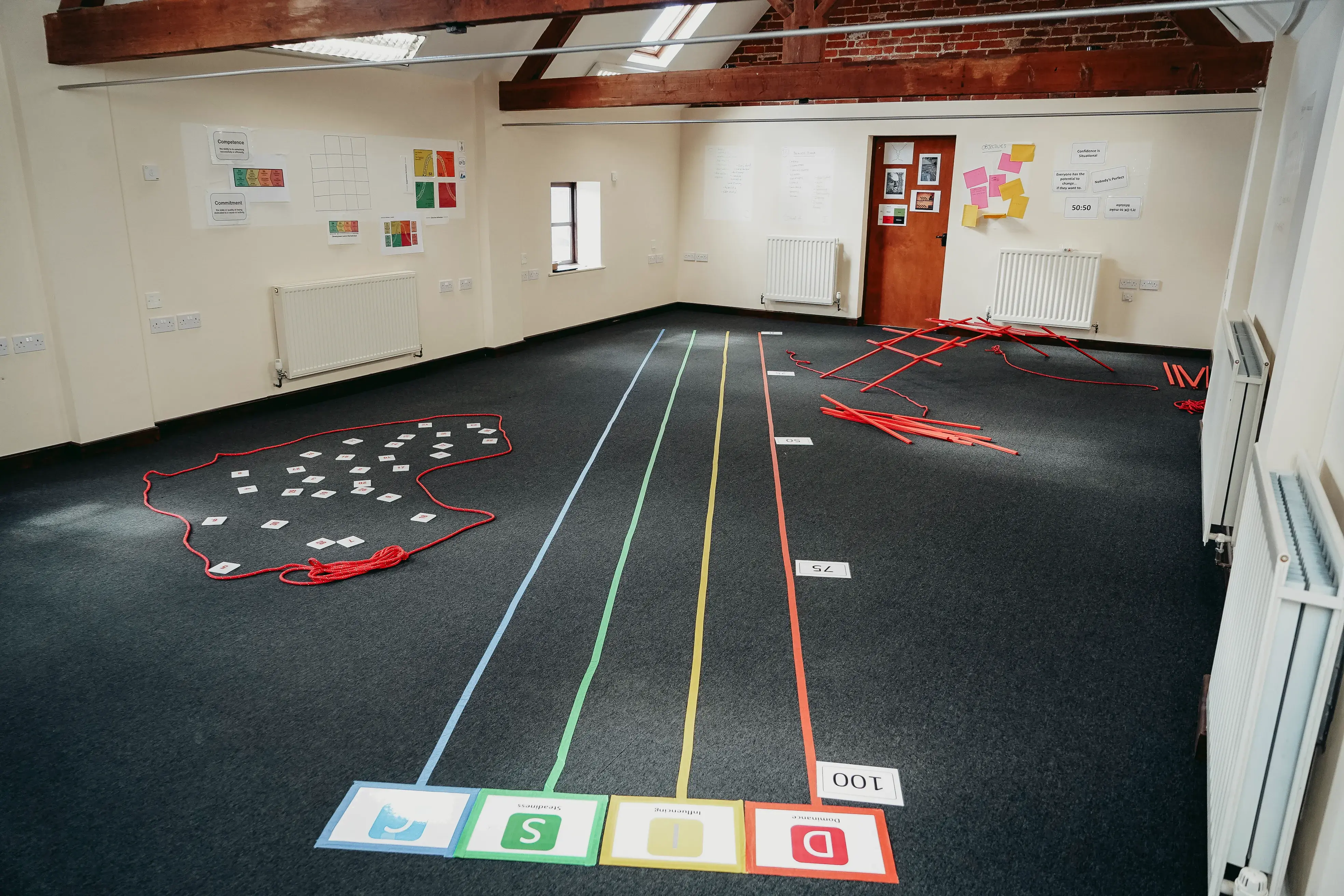Building Bridges, Not Barriers: A Case Study in Effective Management with the Co-op

In the fast-paced world of logistics, effective communication is the glue that holds everything together. For the Co-op’s distribution centres, with their diverse workforce of agency and full-time staff, the challenge was to equip their managers with the skills to navigate complex and sensitive conversations. Like many organisations, they faced a range of challenges, from cultural and generational differences to the misuse of grievance processes. This case study explores how a tailored management development programme helped Co-op managers build trust, foster understanding, and ultimately, have honest conversations that drive performance.
The Challenge: Navigating a Complex Workforce
Co-op's distribution centres are melting pots of different backgrounds, cultures, and generations. This diversity, while a huge strength, also presented unique management challenges. Managers struggled to address performance issues and conflicts effectively, often facing 'weaponised grievances' where formal processes were used to avoid difficult conversations. Preconceived mindsets, often rooted in unconscious bias, could unintentionally worsen these situations. The core problem was a lack of a common framework and set of tools for managers to use when addressing sensitive topics with their teams. They needed to move beyond simply reacting to problems and instead proactively manage conversations with clarity and empathy.
The Solution: A Bespoke Learning Journey
Working closely with Penguin Learning, Co-op commissioned a bespoke programme to address these specific needs. The solution was a series of face-to-face workshops designed to empower both Team and Shift Managers. The programme was meticulously planned to accommodate the 24/7 nature of the distribution centres, with facilitators delivering workshops across multiple shift patterns, including night shifts. This logistical precision ensured maximum attendance without causing significant operational disruption.
The programme was delivered in two key stages for Team Managers, with a separate session for Shift Managers to ensure the content was tailored to their distinct roles.
Team Manager Workshop One: Honest Conversations
The first workshop was a foundational two-hour session focused on increasing self-awareness and understanding the dynamics of 'difficult conversations'. The core belief was that to manage others, you must first understand yourself. The content included:
- Managing Biases and Mindsets: This section was crucial for helping managers become aware of how their own perceptions and assumptions could be hindering productive conversations. By understanding and challenging these biases, they could approach discussions with a more open and objective mindset.
- TTI Success Insights DISC Assessment: Each manager completed a DISC report, and the group debriefing session provided them with a deeper understanding of their own behavioural and communication preferences. This self-awareness was the first step towards adapting their communication style to the needs of their team members. They learned that a one-size-fits-all approach to feedback or coaching simply wouldn't work.
- Conflict Management: Managers were introduced to various strategies for handling conflict, learning to identify when certain approaches were helpful or unhelpful in achieving a desired outcome. This provided them with a clear toolkit for navigating tense situations with a greater sense of control and purpose.
Team Manager Workshop Two: Coaching & Feedback
Delivered a few weeks after the first, the second workshop built on the initial concepts by providing practical frameworks for day-to-day management. This was where the theory met practice, equipping managers with actionable tools to apply their new self-awareness. The key elements included:
- Situational Leadership II: Managers learned to identify the development levels of their team members for specific tasks. This allowed them to adapt their leadership style—either more supportive or more directive—to meet the individual needs of their staff, fostering growth and confidence.
- Coaching Tools and Feedback Models: Participants were given easy-to-apply coaching tools and a simple three-step feedback framework. These models provided a structured way to deliver objective, fact-based feedback, making conversations more productive and less subjective. By layering these tools onto the self-awareness gained from the DISC and SLII models, managers were able to tailor their approach to each individual in their team.
Shift Manager Workshop
Shift Managers, who oversee the Team Managers, attended a focused half-day workshop. This session covered the DISC and Situational Leadership II elements but with a specific lens: understanding the behavioural dynamics within their own Team Manager population. This equipped them with the knowledge to delegate tasks more effectively and communicate in a way that resonated with their direct reports, creating a more cohesive and efficient leadership structure.
The Outcome: A New Era of Honest Conversations
Following the workshops, managers were given post-work to embed their learning. This included 'mapping' the behaviours of their teams to better understand their dynamics and creating a 30/60/90-day action plan to implement their new skills. The programme successfully empowered Co-op's management teams to move beyond their initial challenges. By increasing self-awareness and providing practical tools, the training helped them have more honest, effective, and empathetic conversations, strengthening team relationships and ultimately, creating a more positive and productive working environment across their distribution network. This case study demonstrates how a targeted and logistically smart training programme can transform communication within a diverse workforce, addressing complex challenges with straightforward, actionable solutions.
Upskilling Logistics Managers to have Difficult Conversations
Details
Below is a summary of the content from the workshop
We partnered with Co-op to design and deliver a tailored management development programme for their Team and Shift Managers across distribution centres throughout the UK. The key focus area was to equip managers with tools/techniques to have ‘difficult conversations’ with team members (agency & full time staff) across their packing/picking/transport sections which included a diverse group of individuals from different backgrounds, religions, cultures etc.
Some of the problems included:
- Weaponised grievances
- Cultural differences
- Generational differences
To address key challenges such as cultural and generational differences and the misuse of grievance processes, we delivered a series of engaging, face-to-face workshops on topics including unconscious bias, coaching fundamentals and feedback techniques.
With a nationwide reach and delivery required across multiple shift patterns - From a logistics perspective, the biggest challenge here would be creating a delivery schedule that maximised our time on site and allow us to deliver night shift workshops without incurring significant costs. To meet this need, our Facilitators delivered the content using the following schedule:
- Day shift workshops: 07:00-10:00 and 10:00-13:00
- Back Shift workshops: 15:00-18:00
- Night shift workshops: 23:00-02:00 and 02:00-05:00
Team Manager Workshops
Team Managers attended 2 x 2-hour classroom workshops in their depots:
Workshop One - Honest Conversations
This particular workshop focused on increasing self-awareness and awareness of behaviours when having more ‘difficult’ or ‘honest’ conversations with team members. The focus of this workshop was to give the Team Managers knowledge of this areas which they could then layer onto practical tools
The approach was to give the Team Managers this knowledge, then provide them with practical tools in the following workshop.
This included:
- Managing biases/mindsets - To create awareness of preconceived perceptions could be making more difficult conversations, more difficult.
- TTI Success Insights DISC Assessment - Debriefing learners on their DISC reports in a group form to increase self-awareness of their behavioural and communication preferences and how they may be perceived by others. With this awareness, they can adapt their communication/tailor conversations in the way the recipient needs to hear them, which may be different to how the Managers want to deliver the conversation.
- Conflict Management - Identifying different strategies learners could use during difficult conversations and recognise when these are helpful or unhelpful in achieving the desired outcome.
Workshop Two - Coaching & Feedback
The second workshop - delivered roughly 2-3 weeks after the first workshop - built upon the tools covered in workshop one by giving Team Managers practical frameworks they could follow to effectively coach and develop their team managers. This included:
- Situational Leadership II - Learners can identify their team members' development levels when completing specific tasks and adapt their approach to be more supportive or directive depending on the team member’s development needs.
- Coaching Tools - Introducing learners to easy-to-apply coaching tools that learners can use as a framework to layer on previous tools such as DISC/SLII to tailor conversations.
- Feedback Models - Learners will use a 3-step framework for providing objective, fact-based feedback to make conversations more productive and less subjective.
Post-work:
- Managers to ‘map’ the behaviours of their individual teams to understand the behaviours within their teams and how they need to tailor their approach when managing and developing team members.
- Managers create a 30/60/90 day action plan to implement and apply the tools covered into their teams.
Shift Manager Workshops
Shift Managers attended a ½ day classroom workshop covering the DISC and Situational Leadership II elements from the Team Manager workshop with more focus on understanding the behavioural dynamics amongst their Team Manager populations.
With this knowledge, Shift Managers have greater awareness of the behaviours existing within their Team Manager populations and can adapt communication/delegation of tasks more effectively.
*This is an example of programmes we have designed and delivered specifically to address this area and can be adapted to meet your specific learning objectives and requirements.
- Learning and Development Programmes (13)
- Apprenticeship Levy (7)
- Management Development Training (7)
- Apprenticeship Levy Training Providers (6)
- Case studies (4)
- Behavioural Assessments (3)
- DISC (3)
- Know Yourself Workshops (3)
- ILM Level 3 (2)
- Virtual Workshops (2)
- DISCBehavioural Assessments (1)
- Growth And Skills Levy (1)
- High-Performing Teams (1)
- Transition To Management (1)
Subscribe by email
You May Also Like
These Related Stories

Hoist Finance

Can Virtual Workshops Train Leaders As Effectively As In-Person Ones?



No Comments Yet
Let us know what you think